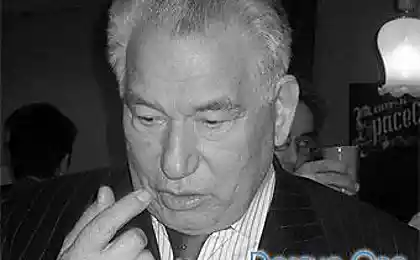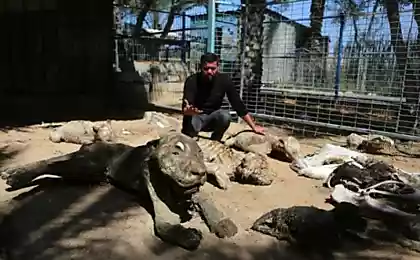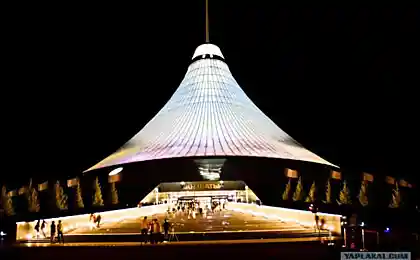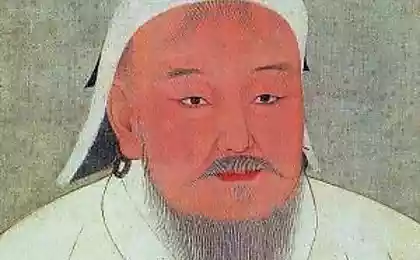1555
Genghis Khan (Temujin)
Always loved the story. Was always interesting as it was in reality. Always amazed at what people are capable of during the war. Always admired the great rulers.
One of these is Temujin (Temuchin).
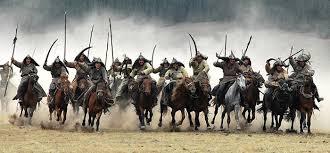
Genghis Khan - the great conqueror. He was born on the banks of the Onon in Mongolia around 1155 g .; originally bore the name of Temujin. His father, Esugaj-Bahadur, apparently, had some influence among the Mongols, but after his death (about 1168), his followers immediately left his widow and children; family several years wandering in the woods, eating roots, fish and game.
Manhood Temujin gradually gathered around him a number of adherents of the steppe aristocracy joined Khan Christian keraitov and participated in an alliance with the Chinese government, first in the struggle against the force of the Tatars, who lived near Lake Buir Nur, then against the democratic movement, led by was his former friend Chzhamuha. After the defeat Chzhamuhi (1201) there was a quarrel between Temuchin and Kerait Khan; the latter entered into an agreement with Chzhamuhoy and drew on his side part adherents Temujin. In 1203 Kerait Khan was killed, and Temujin mastered all of Eastern Mongolia.
Chzhamuha reinstated against him Western Mongolia Naiman, who were also defeated, after which the entire Mongolia united under Temujin; at the same time (1206), the latter took the title Genghis (the exact value of this title is not yet installed), gave them nomadic state based strictly aristocratic device and surrounded himself with bodyguards, who enjoyed considerable privileges compared with other Mongols, but were subject to strict discipline. With the conquest of Genghis Naiman acquainted with the beginnings of the written proceedings, is there in the hands of the Uighurs; same Uighurs entered the service of Chingiz and were the first officials in the Mongolian state and the first teachers of the Mongols. Apparently.
Genghis hoped subsequently replaced Uighurs natural Mongols, as ordered by the Mongolian noble young men, by the way, and his sons, to learn the language and script of the Uighurs. After the spread of Mongol rule, during the life of Genghis Mongols also used the services of Chinese and Persian officials.
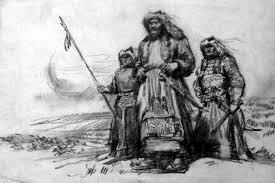
Pursuing fleeing from Mongolia nomads, the Mongols in 1209 took the obedience of Uighurs in East Turkestan, in 1211 - from the Karluk, in the northern part of Semirechye; In the same year the war with China, temporarily stop the successes of the Mongols in the west. North China at that time belonged to the Jurchen, Manchu people origin (Jin dynasty. In 1215, Genghis took Beijing, the final conquest of the Jurchen state was already under the successor of Chingiz, Ugadei.
In 1216 renewed campaigns against nomads who fled to the west; In the same year there was an accidental collision between the Mongolian army and the army of Mohammed Khorezm, united under his rule Muslim Central Asia. Began at about the same time, on the grounds of commercial interests, diplomatic relations between the Chingiz and Mohammed graduated in 1218 looting of the caravan sent Chingiz, and beating merchants Utrar, a border town in the dominions of Mohammed. It made Chingiz without completing the conquest of China, to send troops to the west. In 1218 the Mongols conquered the Seven Rivers and East Turkestan, which owned escaped from Mongolia Naiman prince Kuchlug; in 1219 Genghis personally marched with all his sons, and with the main military forces; in the autumn of the same year the Mongols approached the Otrar. In 1220 was conquered Maverannehr; detachment sent for prosecution of fugitive Muhammad passed through Persia, the Caucasus and Southern Russia, and from there returned to Central Asia. Genghis himself in 1221 won Afghanistan, his son-Tuluy Khorasan, other sons - Khorezm.
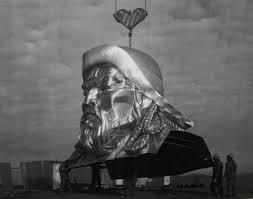
In 1225 Genghis Khan returned to Mongolia. In the lands north of the Amu Darya River and east of the Caspian Sea dominion of the Mongols was it firmly established; Persia and Southern Russia were re-conquered by his successors. In 1225 or early 1226 Genghis marched on the Tangut country, where he died in August 1227 We have quite detailed information about how Chingiz appearance (tall, strongly built, broad forehead, a long beard) and the terms of its character. With the talents of the commander he combined organizational skills, self-control and indomitable will, which could not shake nor failure, no insults, no disappointments. Generosity and friendliness he had enough to keep the affection of his associates. Indulging in the pleasures of life, he, in contrast to most of his descendants remained alien to excesses that are incompatible with the activities of the governor and commander, and lived to a ripe old age, retaining the full power of your mental capacity.
Coming from the people who were at that time in the lowest degree of culture, Genghis was deprived of any education, did not have time to assimilate the knowledge that commanded to teach their sons, and the rest of his life knew no other language but Mongolian. Naturally, the range of ideas it was very limited; apparently he felt only Ataman, who leads his soldiers to victory, gives them wealth and fame and for it has the right to the best part of the production.
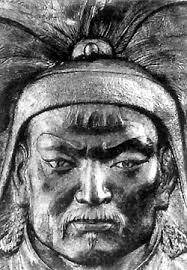
The idea of world domination appears only when the Mongols Genghis successors. Key start, the device Empire were borrowed from the sphere of nomadic life; generic concept of ownership was transferred from the area of private relations in the field of public law; Empire was considered the property of all kinds of the khan; during the life of Chingiz his sons were assigned an inheritance.
With the establishment of the Guard, Genghis had at his disposal a sufficient number of experienced people who could safely entrust the military authorities in remote areas; when constructing the civil administration he had to use the services of the conquered peoples. Apparently, he wanted to liberate from their successors; such a desire is natural way to explain to them the measure adopted by the training of Mongolian youths Uighur script.
Broader civilizing aspirations in Chingiz was not; in his thoughts, the Mongols, in order to preserve its military dominance, were still lead a nomadic life, do not live either in cities or in the countryside, but the use of the works of the hands of the conquered farmers and artisans, and only for this purpose, to protect them. Despite all this, the activities of Chingiz had stronger results than the activity of other world conquerors (Alexander the Great, Tamerlane, Napoleon). The borders of the empire after Chingiz not only not decreased, but increased significantly, and the vastness of the Mongol Empire surpassed all ever existed state.
The unity of the empire remained 40 years after the death of Genghis; domination of his descendants in the states formed after the disintegration of the empire lasted for about one hundred years. In Central Asia and Persia, and now preserved many positions and institutions in these countries entered the Mongols. The success of Chingiz explained only by his brilliant natural gifts; he had no predecessors, who would prepare the way for him, no associates, who could influence him, nor worthy successors. As Mongol warlords and were on the Mongolian cultural service representatives nations were only instruments in the hands of Chingiz; none of his sons and grandsons did not inherit his talents; the best of them could only continue in the same spirit of the founder of the activities of the empire, but could not think of a reorganization of the state on a new basis, according to the requirements of time; for them as for their subjects, Chingiz covenants were unquestioned authority.
In the eyes of contemporaries and posterity Genghis was the sole creator and organizer of the Mongol Empire.
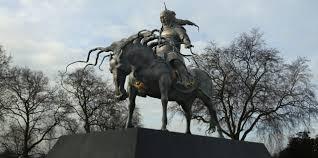
PS Somewhere there is a photo, place where the "standing" of his tent. Especially out of town there.
All good.
If anyone interested infa here
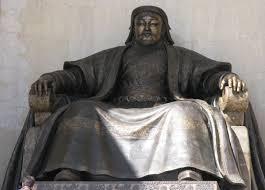
One of these is Temujin (Temuchin).

Genghis Khan - the great conqueror. He was born on the banks of the Onon in Mongolia around 1155 g .; originally bore the name of Temujin. His father, Esugaj-Bahadur, apparently, had some influence among the Mongols, but after his death (about 1168), his followers immediately left his widow and children; family several years wandering in the woods, eating roots, fish and game.
Manhood Temujin gradually gathered around him a number of adherents of the steppe aristocracy joined Khan Christian keraitov and participated in an alliance with the Chinese government, first in the struggle against the force of the Tatars, who lived near Lake Buir Nur, then against the democratic movement, led by was his former friend Chzhamuha. After the defeat Chzhamuhi (1201) there was a quarrel between Temuchin and Kerait Khan; the latter entered into an agreement with Chzhamuhoy and drew on his side part adherents Temujin. In 1203 Kerait Khan was killed, and Temujin mastered all of Eastern Mongolia.
Chzhamuha reinstated against him Western Mongolia Naiman, who were also defeated, after which the entire Mongolia united under Temujin; at the same time (1206), the latter took the title Genghis (the exact value of this title is not yet installed), gave them nomadic state based strictly aristocratic device and surrounded himself with bodyguards, who enjoyed considerable privileges compared with other Mongols, but were subject to strict discipline. With the conquest of Genghis Naiman acquainted with the beginnings of the written proceedings, is there in the hands of the Uighurs; same Uighurs entered the service of Chingiz and were the first officials in the Mongolian state and the first teachers of the Mongols. Apparently.
Genghis hoped subsequently replaced Uighurs natural Mongols, as ordered by the Mongolian noble young men, by the way, and his sons, to learn the language and script of the Uighurs. After the spread of Mongol rule, during the life of Genghis Mongols also used the services of Chinese and Persian officials.

Pursuing fleeing from Mongolia nomads, the Mongols in 1209 took the obedience of Uighurs in East Turkestan, in 1211 - from the Karluk, in the northern part of Semirechye; In the same year the war with China, temporarily stop the successes of the Mongols in the west. North China at that time belonged to the Jurchen, Manchu people origin (Jin dynasty. In 1215, Genghis took Beijing, the final conquest of the Jurchen state was already under the successor of Chingiz, Ugadei.
In 1216 renewed campaigns against nomads who fled to the west; In the same year there was an accidental collision between the Mongolian army and the army of Mohammed Khorezm, united under his rule Muslim Central Asia. Began at about the same time, on the grounds of commercial interests, diplomatic relations between the Chingiz and Mohammed graduated in 1218 looting of the caravan sent Chingiz, and beating merchants Utrar, a border town in the dominions of Mohammed. It made Chingiz without completing the conquest of China, to send troops to the west. In 1218 the Mongols conquered the Seven Rivers and East Turkestan, which owned escaped from Mongolia Naiman prince Kuchlug; in 1219 Genghis personally marched with all his sons, and with the main military forces; in the autumn of the same year the Mongols approached the Otrar. In 1220 was conquered Maverannehr; detachment sent for prosecution of fugitive Muhammad passed through Persia, the Caucasus and Southern Russia, and from there returned to Central Asia. Genghis himself in 1221 won Afghanistan, his son-Tuluy Khorasan, other sons - Khorezm.

In 1225 Genghis Khan returned to Mongolia. In the lands north of the Amu Darya River and east of the Caspian Sea dominion of the Mongols was it firmly established; Persia and Southern Russia were re-conquered by his successors. In 1225 or early 1226 Genghis marched on the Tangut country, where he died in August 1227 We have quite detailed information about how Chingiz appearance (tall, strongly built, broad forehead, a long beard) and the terms of its character. With the talents of the commander he combined organizational skills, self-control and indomitable will, which could not shake nor failure, no insults, no disappointments. Generosity and friendliness he had enough to keep the affection of his associates. Indulging in the pleasures of life, he, in contrast to most of his descendants remained alien to excesses that are incompatible with the activities of the governor and commander, and lived to a ripe old age, retaining the full power of your mental capacity.
Coming from the people who were at that time in the lowest degree of culture, Genghis was deprived of any education, did not have time to assimilate the knowledge that commanded to teach their sons, and the rest of his life knew no other language but Mongolian. Naturally, the range of ideas it was very limited; apparently he felt only Ataman, who leads his soldiers to victory, gives them wealth and fame and for it has the right to the best part of the production.

The idea of world domination appears only when the Mongols Genghis successors. Key start, the device Empire were borrowed from the sphere of nomadic life; generic concept of ownership was transferred from the area of private relations in the field of public law; Empire was considered the property of all kinds of the khan; during the life of Chingiz his sons were assigned an inheritance.
With the establishment of the Guard, Genghis had at his disposal a sufficient number of experienced people who could safely entrust the military authorities in remote areas; when constructing the civil administration he had to use the services of the conquered peoples. Apparently, he wanted to liberate from their successors; such a desire is natural way to explain to them the measure adopted by the training of Mongolian youths Uighur script.
Broader civilizing aspirations in Chingiz was not; in his thoughts, the Mongols, in order to preserve its military dominance, were still lead a nomadic life, do not live either in cities or in the countryside, but the use of the works of the hands of the conquered farmers and artisans, and only for this purpose, to protect them. Despite all this, the activities of Chingiz had stronger results than the activity of other world conquerors (Alexander the Great, Tamerlane, Napoleon). The borders of the empire after Chingiz not only not decreased, but increased significantly, and the vastness of the Mongol Empire surpassed all ever existed state.
The unity of the empire remained 40 years after the death of Genghis; domination of his descendants in the states formed after the disintegration of the empire lasted for about one hundred years. In Central Asia and Persia, and now preserved many positions and institutions in these countries entered the Mongols. The success of Chingiz explained only by his brilliant natural gifts; he had no predecessors, who would prepare the way for him, no associates, who could influence him, nor worthy successors. As Mongol warlords and were on the Mongolian cultural service representatives nations were only instruments in the hands of Chingiz; none of his sons and grandsons did not inherit his talents; the best of them could only continue in the same spirit of the founder of the activities of the empire, but could not think of a reorganization of the state on a new basis, according to the requirements of time; for them as for their subjects, Chingiz covenants were unquestioned authority.
In the eyes of contemporaries and posterity Genghis was the sole creator and organizer of the Mongol Empire.

PS Somewhere there is a photo, place where the "standing" of his tent. Especially out of town there.
All good.
If anyone interested infa here







